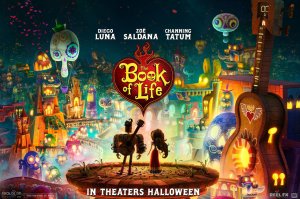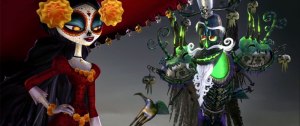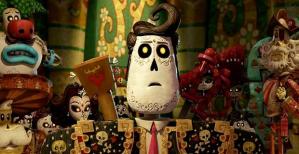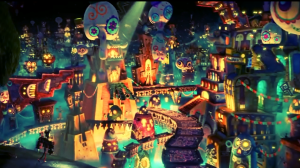As a young teen, I was absolutely in love with Halloween, which eventually led me to research its origins and try to discover similar holidays. It was during one of these fateful Wikipedia searches that I learned about the Day of the Dead. Thus, to understand the movie I’m about to review, I’m going to give the unaware a basic idea of what the Day of the Dead is about.
Mostly celebrated in Mexico and regions with high Hispanic populations, the Day of the Dead is a holiday about remembrance. The purpose of the holiday is for family and friends to gather to pray for and remember the family and friends who have passed away. People build private altars, visit their loved ones graves, and bring them gifts of sugar skulls, marigolds, and favored food and beverages alongside personal items once belonging to the deceased. The intent is to encourage the souls of the departed to visit the living, so the souls will hear the prayers and comments about them.
The Day of the Dead is a really beautiful holiday, as are the festivities and beliefs surrounding it. I deeply encourage readers to look beyond my quick summary, because I can’t spend this entire review going through every piece of the festivities.
So why bring it up at all? Because you should have some idea of what the Day of the Dead is when you go see The Book of Life.
The Book of Life officially begins with a bet. During the Day of the Dead, two spirits—La Murete (Kate del Castillo), ruler of the Land of the Remembered, and Xibalba (Ron Perlman), ruler of the Land of the Forgotten—place a bet on a love triangle developing between three children in the town of San Angel. Xibalba, desperate to escape his lonely, dreary kingdom, bets that if his choice wins, they will switch kingdoms. La Murete agrees, but only if Xibalba promises to stop meddling in human affairs should she win.
The wager is struck, La Murete choosing kind-hearted Manolo to win the hand of the lovely Maria, while Xibalba choose Joaquin, even giving the boy an artifact called the Medal of Everlasting Life to ease his journey to the great warrior that will win Maria’s heart. Due to an incident that involves some escaped pigs, Maria is sent away to Spain to study in how to be a proper young lady.
Ten years later, Maria (Zoe Saldana) has returned, Manolo (Diego Luna) prepares to make his debut as a bull fighter, and Joaquin (Channing Tatum) is the town hero. Old feelings flare up as both start vying for her attention. In the end, Maria seems to have her heart set on Manolo, thus making La Murete the winner of the bet.
So, Xibalba decides to interfere, sending a two-headed snake after the happy couple. When Maria is bitten and apparently killed by the snake’s poison, Manolo asks Xibalba to kill him as well, so he might be with her in the afterlife.
And this is where things get good.
(There’s also some subplot with some bandits, but that’s not the part anyone came for.)
The Characters
One thing that will truly endear viewers to this story are its characters.
Starting from the bottom we have Maria. She’s beautiful, she’s feisty, she’s not afraid to do what’s right. And that’s about it. While Maria is fun and definitely doesn’t fall into the territory of damsel, I felt like she was just an enjoyable love interest and nothing more. While her male companions both have struggles to overcome, Maria’s biggest personal struggle lies in how her father deems her unladylike, something that is remedied pretty well after the ten year time skip. She manages to become more of a lady without losing the essence of who she is and becoming a total badass in the process. I feel like she didn’t have anything to overcome that would put her on the same interest level as her male companions.
Speaking of them, I will say that one thing I did like about Maria was that she knew what she wanted. While she likes Joaquin as a friend, it’s very obvious that it’s Manolo she’s in love with. Even when she was teasing him, the audience gets a definite impression of how she feels for him. When it comes to love triangles, I’m always a fan of the heroine knowing exactly what she wants and not having “which gorgeous guy shall I choose” as her main struggle.
Next is Joaquin. While he definitely doesn’t come of all well as his friends, being selfish and glory obsessed even as a kid, you get a good impression of why he’s like that. Unlike Manolo and Maria, it’s heavily implied Joaquin has no family left in the Land of the Living. He’s also trapped under his father’s shadow. Joaquin’s father was a general and at one point the town hero before meeting his death at the hands of the bandit Chakal (who becomes the villain of the story near the end). Joaquin feels he needs to live up to that, or even surpass it, but at the same time doubts his own abilities.
So, ten years later, and with Xibalba’s Medal of Everlasting Life, it’s easy to see how such a kid could become a town hero who seems to be more in it for the glory than doing actual good. Adult Joaquin comes off as very arrogant—the guy even shouts his own name as a battle cry—but one thing I think the writers did right was not turn him into the stereotype of the friend-turned-rival against Manolo. Yes, Joaquin comes off as a bit of a jerk, but deep down he’s still insecure and he’s still a good person. This becomes most evident after Maria learns that Manolo is dead. Her father, desperate to convince Joaquin to stay so he can defend the town from Chakal’s horde, tries to marry them off. Yet it’s here we see that Joaquin knows Maria doesn’t love him and doesn’t want to force her into anything to make her unhappy. We get the impression that he’d stay to defend the town even if Maria wouldn’t marry him. He never gets to say as much, but we see it. Scenes like this make his character development at the end seem more realistic.
One thing about both these characters that did jar me was that neither of them have accents. The trailer made it clear Channing Tatum wasn’t even going to try, but it gave the impression that Zoe Saldana would and she doesn’t. It’s a bit noticeable when every other member of the human cast actually sounds Mexican.
Once you’ve seen the trailer, there are two characters whose designs are just going to stick with you: La Murete and Xibalba. La Murete seems to combine two of the most common pieces of Day of the Dead imagery in her design—those being La Calavera Catrina and the traditional sugar skull candy. Xibalba in contrast is made out of tar, what looks like Herbert West’s reanimation fluid, and has red skulls for pupils. Both are immediately eye catching and otherworldly, and it’s very easy for viewers to guess which one is the good side of death and which is the bad.
But where it would be very easy to cast Xibalba as the villain, every scene where he interacts with La Murete counteracts that expectation. One thing a viewer is immediately going to recognize about these two is that they’re married, though estranged due to some past incident. While Xibalba is mischievous, amoral, and kind of a liar, you can see that he really loves La Murete and does want to make amends. He’s just bad at it. La Murete, for her part, loves Xibalba back, but she simply can’t condone his behaviour. Their relationship is really one of the most endearing things about them.
The movie also shows that their personalities are pretty influenced by their views on humans. As the ruler of the Land of the Remembered, La Murete seems the best parts of humanity, the parts that love and cherish others even after death. As a result, she’s kind, loving, and feisty. Xibalba rulers over the Land of the Forgotten, constantly surrounded by loneliness and misery, so it’s understandable that he wouldn’t think highly of humans. These characters aren’t meant to be representations of Heaven or Hell or God and the Devil. They’re two different views on death and how those views can twist perceptions of humanity.
Finally, we get to Manolo, our protagonist. Gentle and kindly, Manolo is a passionate musician torn between doing what he loves and doing what his family has done for generations: bull fighting. Though he has the talent for both occupations, repeated scenes of him being dragged away from his musically-minded friends by his father tells the audience where he’d rather be. Part of the reason he clings to his music is because of Maria. She always encouraged him to “play from [your] heart,” something she even had engraved into a guitar she gave him as a gift.
Even if you didn’t see the trailer, it’s evident from the beginning Manolo is Maria’s choice. From their interactions as children to the way Manolo expresses his love for her as an adult, it’s clear that Joaquin didn’t really stand a chance. Rather than big, public displays of affection, Manolo seeks privacy for the both of them and doesn’t do anything he knows would make Maria uncomfortable. Their relationship is sweet and it leaves the audience rooting for him from the start.
Really, The Book of Life is Manolo’s story. Once he arrives in the Land of the Remembered and learns Maria isn’t dead, he’s determined to face any challenges to find La Murete and have the chance to go back to the Land of the Living. And it’s through this journey that he learns he should follow his heart and be the man he wants to be.
This group is accompanied by a varied cast of unique and colourful characters. From the lively Candlemaker, to the citizens of San Angel, to the deceased members of Manolo’s family residing in the Land of the Remembered, The Book of Life has a lot of unique personas for the audience to enjoy.
The Animation
If there’s one thing I’ve noticed about any animated films I’ve seen based on the Day of the Dead, it’s how colourful the worlds are. The town of San Angel is bright and lively, but rustic at the same time, taking many colour cues from the surrounding landscape. It’s when Manolo reaches the Land of the Remembered that your artist friends are going to try to contain their delighted shrieks.
Take what is bright and lively about the World of the Living and amplify it indefinitely. Make it look like festivals are going on non-stop. There’s music, smiling faces, dancing. There’s this endless cacophony of colour. You feel a real sense of joy looking at the Land of the Remembered, even if its inhabitants all look like calaca (skeletons dressed for Day of the Dead). Truthfully, I can’t do the place justice in my allotted words.
It’s this sense of brightness in two of the worlds that makes the third land—the Land of the Forgotten—strike the viewer in the face. It’s dreary, and endlessly grey. There’s no sound but a cold, howling wind. The only inhabitants are sickly looking souls who fade to dust as they’re forgotten by the living.
The Music
Now, this is the part that I had some difficulty with. I’m not talking about the background music or anything used to set the mood. I’m talking about the fact that this movie is technically a musical.
The trailers I saw offered no indication that this movie was a musical, and it certainly varies from the animated musicals we’ve come to know from the likes of Disney. For starters, there are no big show-stopping numbers (except maybe at the end) and for the most part the singing was left to one character: Manolo.
Now, as part of Manolo’s struggle is his desire to be a musician as opposed to being a bull fighter, it would make sense that he should do some singing. I think the movie tries to go with a more realistic feel to how musical numbers would appear. Manolo sings for Maria, he sings quietly to himself after he becomes the town laughingstock when he refuses to kill the bull after a fight, he sings to soothe the spirits of the thousands of angry bulls his family has killed when in the afterlife. It’s a different, but interesting take on the musical.
I think the weirdness comes with The Book of Life being a jukebox musical. There are only two original songs in the movie, with every other song being hits from the past twenty years or so remade to better fit the setting. I felt some songs worked well enough, but it might be a little jarring to hear a man in 1920s Mexico singing “Creep” by Radiohead.
Summary
Truthfully, I could talk at length about this movie. From Manolo’s journey of self-discovery, to the beautiful animation, to the fun cast of characters, this is a movie I’d recommend to everyone.
I think where this movie suffers the most if the bandit subplot. Chakal’s gang coming to attack San Angel felt a little tacked on, as if its whole purpose was to allow for a big, action-packed climax (and some character development for Joaquin). While the climax was enjoyable for what it was, The Book of Life is really about Manolo’s journey.
Overall, this movie was funny, enjoyable, and it offers a nice introduction to the Day of the Dead for the unaware.
Final Rating: 8 out of 10 stars.





Reblogged this on A Funny Thing Happened While I Was Away From The Keyboard… and commented:
As I was asked to be a guest reviewer by a friend of mine, and this was the last movie I saw, enjoy my thoughts on The Book of Life.